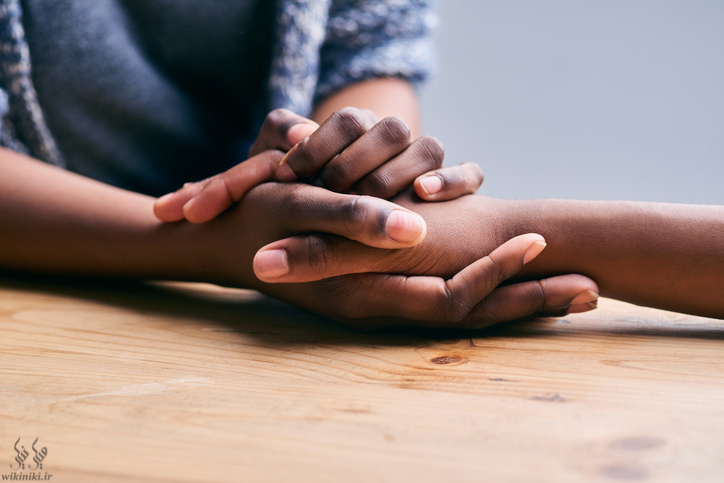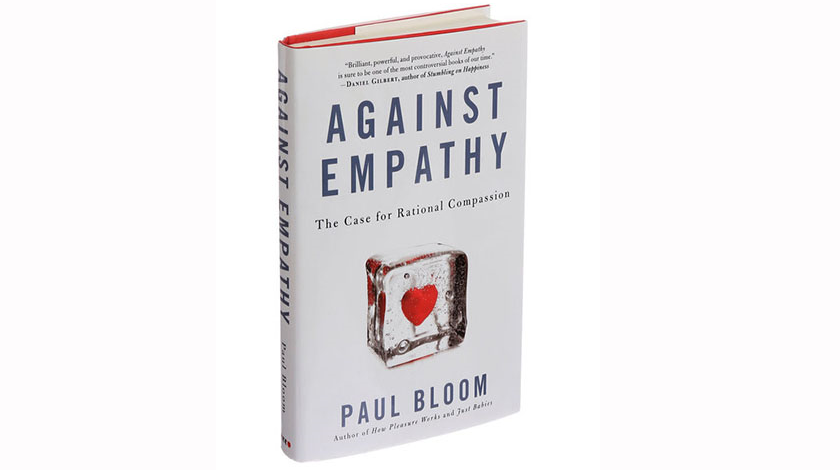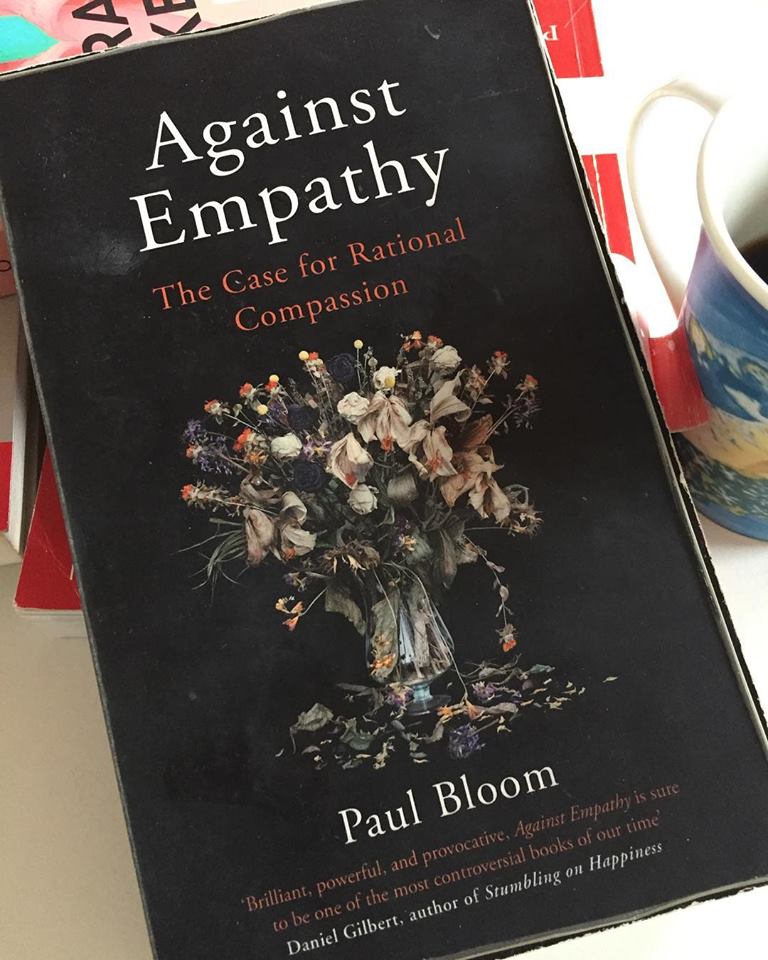Who can be against empathy?
If our moral intuitions align on anything, is it not on the idea that empathy for other human beings is a good thing?
What harm could come from identifying with the thoughts and feelings of our fellow creatures?
According to Paul Bloom, a professor of psychology at Yale, most of us are completely wrong about empathy. The author of a new book titled Against Empathy, Bloom uses clinical studies and simple logic to argue that empathy, however well-intentioned, is a poor guide for moral reasoning.
Worse, to the extent that individuals and societies make ethical judgments on the basis of empathy, they become less sensitive to the suffering of greater and greater numbers of people.

“I want to make a case for the value of
conscious, deliberative reasoning in everyday life, arguing that we should strive to use our heads rather than our hearts.”
Such is the plea that Bloom makes in the opening pages of the book. What follows is a lucidly argued tract about the hazards of good intentions.
I sat down with Bloom to talk about his case against empathy. To be perfectly transparent, I read Bloom’s book — and entered into this conversation — with a fair degree of skepticism.
I’ve long believed empathy to be the basis for human solidarity (for reasons I explain below). So if he’s right, then I’ve been wrong for virtually all of my life.
After reading his book and engaging him in this conversation, I think he’s (mostly) right.
How do you define empathy? And how is it distinct from, say, compassion or sympathy?
"It’s a great question because a lot of people freak out when they see my title. I’ve come to realize that people mean different things by empathy.
Some people take empathy to mean everything good or moral, or to be kind in some general sense. I’m not against that.
There’s another sense of empathy which is narrower and which has to do with understanding other people. And that’s not exactly what I’m talking about. I think that understanding people is important, but it’s not necessarily a force for good. It can be a force for evil as well.
By empathy I mean feeling the feelings of other people. So if you’re in pain and I feel your pain — I am feeling empathy toward you. If you’re being anxious, I pick up your anxiety. If you’re sad and I pick up your sadness, I’m being empathetic. And that’s different from compassion.
Compassion means I give your concern weight, I value it. I care about you, but I don’t necessarily pick up your feelings.
A lot of people think this is merely a verbal distinction, that it doesn’t matter that much. But actually there’s a lot of evidence in my book that empathy and compassion activate different parts of the brain. But more importantly, they have different consequences.
If I have empathy toward you, it will be painful if you’re suffering. It will be exhausting. It will lead me to avoid you and avoid helping. But if I feel compassion for you, I’ll be invigorated. I’ll be happy and I’ll try to make your life better.
I take all the points you just made, but empathy still strikes me as a largely positive — or useful — emotion. One could argue that having empathy actually opens the door to more compassion.
My beef is with empathy in particular, with its role in decision making. Empathy has certain design features that do make it positive in certain restricted circumstances.
If you and I are the only people on earth and you’re in pain and I can help you and make your pain go away, and I feel empathy toward you and so I make your life better, empathy has done something good. But the real world is nowhere near as simple.
Empathy’s design failings have to do with the fact that it acts like a spotlight. It zooms you in. But spotlights only illuminate where you point them at, and for that reason empathy is biased.
I’m likely to feel empathy toward you, a handsome white guy, but somebody who is repulsive or frightening I don’t feel empathy for. I actually feel a lot less empathy for people who aren’t in my culture, who don’t share my skin color, who don’t share my language.
This is a terrible fact of human nature, and it operates at a subconscious level, but we know that it happens. There’s dozens, probably hundreds, of laboratory experiments looking at empathy and they find that empathy is as biased as can be.
The second problem is the innumeracy. Empathy zooms me in on one but it doesn’t attend to the difference between one and 100 or one and 1,000.
It’s because of empathy we often care more about a single person than 100 people or 1,000 people, or we care more about an attractive white girl who went missing than we do a 1,000 starving children who don’t look we do or live where we don’t live.
So it might feel good but empathy often leads us to make stupid and unethical decisions.
Is empathy necessarily a spotlight? Does it have to be focused on one or two people at a time? Is that part of the structure of empathy or is that just the most common manifestation?
I think it’s part of what empathy is. Empathy as we’re talking about it is, “I put myself in your shoes.” So how many people can you do that with?
Well maybe I could do that with you and some other guy at the same time. You’re feeling different things and I kind of got them both in my head. Can I do it for 10 or 12 or a 100 people? No. Maybe an almighty god could do that, could empathize with every living being. But typically, we zoom in on one.
And so it’s different from morality more generally. When I make a moral judgment, I can take into account, if I do this, 10 people will suffer but a thousand people will benefit. And with health care, gun control, or something like that, you deal with numbers.
But empathy, by its very nature, is like a spotlight.
So it’s your view that empathy is not only a poor guide for moral reasoning; it actually makes people — and the world — worse?
I think empathy is a great for all sorts of things. It’s a wonderful source of pleasure, for instance. The joy of fiction would disappear if we couldn’t, on some level, empathize with the characters. A lot of our intimacy would fade. I think empathy is central to sex. It’s great for all sorts of things.
In the moral domain, however, empathy leads us astray. We are much better off if we give up on empathy and become rational deliberators motivating by compassion and care for others.
Can you give an example of empathy gone wrong in everyday life?
I’ll give a controversial one and then a less controversial one. The controversial one has to do with the role of empathy in our criminal justice system, specifically victim statements.
In many states, not all, there are victim statements, and these victim statements allow people talk about what happened to them and what it was like when their family member died or when they were assaulted; these often determine sentencing.
I could not imagine a better recipe for bias and unfair sentencing decisions than this. If the victim is an articulate, attractive, white woman, it’s going to be so much more powerful than if the victim is a sullen, African-American man who doesn’t like to talk about his feelings.
You suddenly turn the deep questions of how to punish criminals into a question of how much do I feel for this person in front of me? So the bias would be incredibly powerful. So that’s case one.
Case two is about Donald Trump. Trump’s rhetoric about immigrants and Muslims was often framed, particularly early in his campaign, in terms of the suffering of people. He would actually tell these stories. In his rallies, he would tell stories of victims of rape and victims of shooting.
He would tell stories of people who lost their jobs. And he was appealing to the empathy of supporters, whose concerns extended mostly to their own tribe.
Three hundred years ago, Adam Smith noted that when you feel empathy for someone who’s been abused or assaulted, it translates into anger and hatred toward those who’ve done the abuse. And I think we see that in the real world all the time.
Whenever somebody wants you to kick a bunch of people out of your country or go to war, they’ll tell you a really sad story of some poor person who looks like you and got victimized in some way. Sometimes the story is false, sometimes it’s true, but it is a case in which empathy really goes wrong.
I find your broad arguments about empathy persuasive, but I think your critique doesn’t hold as well for interpersonal relationships or parent-child dynamics. On some level, aren’t we obliged to care more about the people that we love or the people we call friends? And if that’s true, doesn’t that require something like empathy?
This is a great question. I have a whole chapter where I struggle with this. A lot of my book is like, “this is the way it is, man.” But I have a chapter on intimate relationships where I struggle exactly with these questions. It goes off in two directions.
So one direction is, “empathy is biased, it plays favorites,” but there are some biases that don’t seem bad. I love my kids a lot more than I love you and I’m not ashamed of that. I don’t think I’m making a moral mistake. And I don’t think it’s a mistake to care more about my friends and my family than about strangers.
I think I’m making a mistake if I care about white people more than dark-skinned people. But friends and family? That seems right. In that sense, the bias of empathy isn’t such a problem. But I think the bias that that reflects is just a more general bias.
If you took away empathy from my brain, I’d still love my kids. Because every other emotion is going to go in that direction. In that case, I think empathy’s bias per se isn’t a problem.
The other strand of your question is, the examples we’ve been giving so far have been about policy issues — going to war and victim statements. What about dealing with your kids, with your wife, with your friends? Don’t you want to be empathic to them? And I think the answer to that is mixed. I think the answer is often no.
Suppose you come to me and you’re freaked out, you’re anxious. Do you really want me to get anxious too? Do you want me to empathize with your anxiety, not just understand but feel it too? Presumably not. You want me to be calm. If you’re depressed, you don’t want me to sink into depression. Then you’ve got two problems instead of just one. You want me to sort of be uplifting, cheer you up, put things in perspective.
I think there’s a case for empathy, particularly with positive emotions. If we’re friends and something great has happened to you, you may want me to share your joy, not just be happy that things are well with you but actually share your positive feelings. I see nothing wrong with that.
You made an interesting distinction there between feeling and understanding, and you alluded to this earlier as well. I wonder if you could unpack that just a bit. Are you saying that to be empathetic is to feel what someone is feeling, and not merely to understand it or relate to it in some way?
It’s actually critical to my argument that those are two separate things. Everybody agrees that to be a good person you have to understand other people. You can’t buy someone a birthday present unless you understand them on some level. And you can’t make a kid happy if you don’t understand her.
Now as we said in the beginning, understanding is also necessary if you want to ruin somebody’s life, if you want to seduce them or con them or torture them. But understanding still seems to be a necessary condition for doing good. So if it turns out understanding and feeling are essentially entangled, then I can’t argue against empathy. But they aren’t entangled. You can easily find dissociations.
One such disassociation is the competent psychopath. So some psychopaths are not as impressive as you might think. They’re just kind of screwed up people. But some psychopaths are really good with other people. They’re really good with other people because they understand them. They know what you want. They know what you like. They know you better than you know yourself, but they don’t give a shit. They could cause you a lot of pain and not blink.
Do you see any social utility at all to empathy?
I think it leads us to poor moral decisions, but it’s often what people want. There are a lot of cases where people want another person to feel what they feel. Some cases are cases of moral persuasion where I want you to persuade you to help me and to get you to do that I need to get you to feel what I feel. My kid’s in the hospital. I need money for an operation. How would you feel? I try to motivate that as part of persuasion.
I take your point that empathy is often tribalistic, but must it be it that way or is that what it is for most people most of the time? Consider a Buddhist monk or someone who meditates regularly on compassion. Empathy in these cases is not directed at particular people. I’d argue that empathy, exercised in this way, is an orientation, not an emotion directed at someone or something.
Those are two different questions. The monk stuff is interesting. I talk about monks and meditation and Buddhism in my book. They really caution you about empathy. They say to get what you’re talking about, to get where you are, you have to jettison empathy and feel love and compassion, loving kindness. But don’t try to crawl into people’s heads. That will exhaust you. That will cause all sorts of problems.
There’s some evidence that meditative practice and mindfulness meditation makes you into a sweeter person. There’s no definitive evidence of this, but the argument is that mediation makes you more compassionate by diminishing your empathy, so you can help without feeling suffering.
Here’s an analogy I give: Isn’t it unfortunate that people overwhelmingly like delicious and fatty foods? Why can’t they enjoy eating protein powder or spinach day and night? Can you say that it’s impossible to have a person who hates hot fudge sundaes and steaks and enjoys chewing protein powder?
Is it impossible to have somebody who isn’t sexually aroused by attractive young people but is instead sexually aroused by virtuous people? Is it impossible there are people who are only angry at global warming but if you chopped off their arm, they wouldn’t mind at all? I don’t know. I don’t think we’re such creatures.
I got into a discussion with a British academic over the Israeli and Palestinian conflict. He says the problem is not enough empathy. I said the problem is too much empathy. He says, but can’t you imagine a person, an Israeli, who feels as much empathy for the Palestinians as he does for his own family? I could imagine it. It’s just not how we typically tend to work.
I’ve always felt that identification with another’s suffering was the key impetus for human solidarity, and that empathy is a gateway to recognizing the commonality of experience. If we want to make the critical shift from solipsism to collective consciousness, don’t we need something like empathy?
I wouldn’t say with confidence that that’s wrong. In some ways, to the extent that empathy can do it, it’s the effect, not the cause. That is, if you put yourself in somebody’s shoes — a person in Africa, a trans individual, a nonhuman, someone who you otherwise wouldn’t relate to, you already have to acknowledge them as a person. It’s not like empathy is this magical thing.
Empathy is a psychological process of imagination. Basically you’re choosing to make that imaginative leap. But that’s the moral choice. Empathy is just the one way you enact it. But then the question is, do you need to enact it? I think about rights revolutions in our times. The dramatic change in attitudes toward gay people and, more recently, the dramatic change in attitudes towards trans people.
I’m not convinced that everybody’s who’s changed or everybody’s who acknowledges these rights, these groups who are otherwise included, does so because they imagine what it’s like. I imagine what it’s like to be a man who wants to have sex with another man and can’t marry. I imagine what it’s like to be somebody with a penis who identifies herself as a woman. Maybe I do that. Maybe I don’t. Maybe I just say, I hear your argument about human rights, and there’s no reason to deprive them.
Perhaps it’s better to think of empathy as an instrument, not a virtue. It can be used for good or ill, depending on the person in whom it’s exercised. Con men, as you say, are exceedingly empathic, which is why they’re so effective. Someone like the Dalai Lama is similarly empathic, only his empathy is put to much better ends.
I think when it comes to moral reasoning, empathy is just a bad idea. It just throws in bias and innumeracy and confusion. But yes, when it comes to moral motivation, empathy can be used as a tool. If I want to get you to help the baby, I can say, look at the baby’s family, I could do that. If I want you to lynch African Americans in the South, I can say, look at these white women who’ve been raped, feel their pain, let’s go! It is a tool.
My point is that there are better and more reliable tools.
I’ve argued elsewhere that privilege has a way of blinding the privileged, and that that is a big reason why people fail to notice the role of luck in their own life and, more importantly, the role of misfortune in the lives of others. Obviously the political implications of this are terrible. I’ve always understood this to be an argument in defense of empathy. Am I mistaken?
I’ve never thought of it that way. I actually think attempts at empathy might actually make things worse. A friend of mine, another white guy born into privilege, once said very honestly, “I don’t really understand why poor people would do this or do that. If I were in their shoes, I would do this and that and so on.”
You could argue that he’s just not empathizing strong enough; if he fully appreciated what it’s like to lack the right education and so on, perhaps then he’d understand. I wonder if an appreciation of contingency, of blind luck, isn’t something you get through empathy but through a broader understanding.
I’m not entirely sure, but it’s a great question.
I don’t share this view, but there some who think that you place too much faith in pure reason as a guide to morality. At some point, don’t you have to smuggle value or emotion into this? You can easily reason your way into eugenics or some other repugnant worldview, after all.
I make a distinction. I think reason is how we come to conclusions and, more specifically, how we achieve certain ends. What ends you seek can be derived from reason based on some other goals, but they’re ultimately not determined by reason.
I could say, I want to make the world a better place and here’s how we should do it. And you could challenge me and say, why do you want to make the world a better place. I’m just going to say, I just do. So reason has to end somewhere.
I’m most interested in cases where rational people share the same goals and then the question is roughly how to get there. And there I think reason is better than emotions.
Source: Vox Website







Write Your Comment